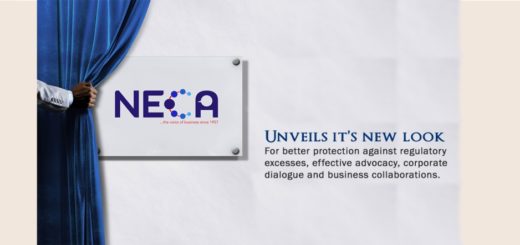BUSINESS ESSENTIALS Vol. 3 No 14
The rising inflation figure as recently released by the National Bureau of Statistics (NBS) is not only disturbing but not in the least a welcome news for business. We took time to review the soaring inflation trend and its possible impact on the economy. As part of our continued enlightenment activity, we also informed you of the recent introduction of electronic certificate of Capital Importation by Central Bank of Nigeria (CBN) and its benefits to the business community.
Our regular Labour and Employment Law Review and Upcoming Training programmes were not left out.
Have a pleasant reading.
Timothy Olawale
Editor
In this issue:
- Inflation Rate Soars to a 6-year High
- Introducing the Electronic Certificate of Capital Importation (E-CCI)
- LABOUR & EMPLOYMENT LAW: Action in a Representative Capacity (Livinus A. Olisakwe & 4 others – for themselves and on behalf of sacked staff of Air Nigeria Development Limited vs. Air Nigeria Development Limited & 2 Others,2014) 51 N.L.L.R. Pt 170, P. 438 NIC
- Upcoming Trainings Programmes
- Announcing the 59th Annual General Meeting (AGM) of NECA
|
Design the Right Recruiting Strategies to Attract Top Talent The fight for new talent is intense across all industries. To connect with the best and brightest, you need to redesign your recruiting strategies to meet people where they are. Don’t rely on the same old social media platforms — venture out. Find platforms that are connected to the industry you’re recruiting for, and then look for people who are using them to have smart, relevant conversations. If you’re impressed by someone’s questions, answers, or posts, you may have identified a potentially valuable employee. And don’t forget to tap your current employees. They can tell you where they connect with like-minded individuals, and help you to launch networks, events, and training programs that are organized to meet your company’s specific needs. Adapted from “Recruiting Strategies for a Tight Talent Market,” by Erica Dhawan |
INFLATION RATE SOARS TO 6-YEAR HIGH: MATTERS ARISING
The National Bureau of Statistics (NBS) recently released the Inflation rate for the Month of May 2016, which showed that the Headline index increased by 15.6% (YoY), 1.9% points higher from rates recorded in April (13.7%). The figure reflects a relative strong increase for the fourth consecutive month and the highest in nearly six years.
|
Month |
Inflation Rate (%) |
Change |
% Change |
|
December 2015 |
9.55 |
||
|
January 2016 |
9.62 |
0.07 | 1% |
|
February 2016 |
11.38 |
1.76 | 18% |
|
March 2016 |
12.77 |
1.39 |
12% |
| April 2016 |
13.72 |
0.85 |
7% |
| May 2016 | 15.58 | 1.86 |
14% |
Source: National Bureau of Statistics (NBS); NECA Research 2016
May 2016 was an interesting month in which a series of defining events took place. These factors, alongside the traditional cost-push factors, pushed inflation higher. They include:
- The nominal price of the PMS was increased by 68% to N145, though the average price across the country was already N162.
- The value of the Naira remained stable at the inter-bank market, while it depreciated at the parallel market by 8.63% to close at US$/N351.00 from US$/N320.70 at the end of May. The depreciation recorded at the parallel market between the two months under review further increased the prices of imported consumer good prices in the domestic market.
- The scourge of the Tuta Absoluta moth significantly reduced tomato supply, sending prices to a record high of N45, 000 per basket.
- The prices of most of the food items in May 2016 increased. The prices of pepper, tomatoes, yam, rice, garri, onions, palm oil, sweet potatoes, meat, Irish potatoes, beans and vegetable oil increased by 140%, 77.58%, 25.60%, 17.04%, 13.33%, 13.10%, 10.71%, 10.32%, 8.33%, 7.58%, 6.48% and 0.52% respectively. Meanwhile, the price of fish remained unchanged.
- We also noticed increase in Transport, Housing, Water, Electricity, Gas & Other Fuels divisions.
- The price of diesel increased by more than 20%. This was because of poor power supply in May as well as a decrease in the supply of diesel. Additionally, suppliers have decreased trading diesel in favour of the higher-margin PMS. Diesel is used to power trucks that transport agricultural products from the rural to urban areas.
Inflation this year is devoid of wage pressure. Labour unions have made ludicrous demands of approximately 200% wage increase. This is at a time when labour productivity growth is at (-0.4%) according to The Economist Intelligence Unit (EIU). Inflation has been muted by strong consumer resistance due to falling discretionary income.
The CBN’s plan to adopt a flexible exchange rate regime implies a possible reduction in the uncertainty that has been a fixture in the forex market. The delay in releasing the details of the new forex framework is causing heightening uncertainty in the forex and capital markets.
Inflationary Trend of Other African Countries
The average inflation rate across Africa is 10.8%. The inflationary trend across SSA is generally a mixed bag. The countries that witnessed higher price levels include Angola and Uganda. Angola’s inflation rate increased from 23.6% to 26.41% in April, the highest in 11 years. It was driven by imported inflation due to a weakened currency. Uganda’s inflation rate rose for the first time in 2016 from 5.1% in April to 5.4% in May. This increase in price levels was fuelled by higher core inflation.
Countries that had a slowdown in inflation include Ghana, Kenya and South Africa. Ghana’s inflation rate declined to 18.7% in April from 19.2% in March due to a slower increase in the price of housing, utilities, food and transport. Kenya’s inflation rate eased to 5% in May from 5.27% in April. This decrease was due to a slowdown in food prices, housing and utilities. Furthermore, South Africa’s inflation rate was 6.2% in April, down from 6.3% in March. The decline in inflation rate was mainly due to lower petrol costs.
Advertisement
Possible Impact of rising inflation on economy
The high inflationary environment would have various impacts on policies, the markets and various economic agents. Some of these impacts include:
- Interest Rates: Inter-bank interest rates have been trading between 2.5% and 5% in recent times due to increased liquidity. With further increase in the inflation rate, negative real returns will be higher. The market does not expect an increase in benchmark interest rates as policy makers seem focused on stimulating growth.
- Exchange Rate: The uncertainty in the forex market, as well as forex shortage, will still continues to feed into inflation. An adoption of a flexible exchange rate will help stabilize the forex market and remove the uncertainty that has pushed prices up.
- Capital Market: The NSE ASI appreciated due to the announcement of a flexible exchange rate framework. However, the Nigerian equities market has recorded losses in the past few days due to delay in the release of the guidelines for the flexible foreign exchange rate policy. In the fixed income market, bond rates have remained between 13% and 14% in recent weeks. Thus, we do not expect any significant changes unless liquidity varies considerably.
Introducing the Electronic Certificate of Capital Importation (e-CCI)
We are pleased to inform you that the Central Bank of Nigeria (CBN) has automated the process of Certificate of Capital Importation (CCI) issuance to facilitate efficient service delivery and operational efficiency. Subsequently, the CBN has directed that all active CCIs (which has not been utilized or not fully utilized) should be migrated to the e-CCI portal as physical CCIs will be phased out upon go-live.
A Certificate of Capital Importation (“CCI”) is a certificate issued by a Nigerian bank confirming an inflow of foreign capital either in the form of cash (loan or equity) or goods. A CCI is usually issued in the name of the investor within 24- 48 hours of the inflow of the capital into Nigeria. The primary purpose of the CCI is to guarantee access to the official foreign exchange market for repatriation of capital and returns on investment – dividend, interest, and capital on divestments. A copy of the CCI must be presented to the Nigerian bank to process a remittance by the requesting company.
Historically, CCIs have been issued in hard copy and, for repatriation purposes, the hard copy of the CCI had to be marked down by the bank. This has led to a situation where investors are unable to make repatriations in the event that an original CCI had been lost or destroyed. The CBN has now decided to automate the process by migrating to electronic CCIs (e- CCIs). The e-CCI will be on a server that is maintained by the CBN.
Benefits of the e-CCI include:
- No more worry over the safe-keeping of the physical CCIs.
- No more cases of lost CCI in transit (as a result of mishandling) or damage from fire outbreaks.
- Easy tracking of investments across the banks as users will be able to access their investments using a unique identifier.
- Elimination of transfer and indemnity letter to other banks since the process is electronically and this will improve turn-around-time.
- Requests requiring CBN’s approval will now be sent online and status can be easily tracked.
- Drastic reduction in paper usage
Note: Holders of active CCIs (i.e. CCIs with outstanding/un-repatriated amounts) would be required to return the original to the issuing bank for uploading on the new platform on or before 30 June 2016.
OPINION
- It is clear that government is keen to move from manual to electronic systems. This should lead to better efficiency, ease of transaction and more transparency.
- Affected companies should liaise with their banks to confirm the specific process and requirements for migration of the paper CCIs.
LABOUR & EMPLOYMENT LAW: Action in a Representative Capacity (Livinus A. Olisakwe & 4 others – for themselves and on behalf of sacked staff of Air Nigeria Development Limited vs. Air Nigeria Development Limited & 2 Others, 2014) 51 N.L.L.R. Pt 170, P. 438 NIC
Facts:
- By a General Form of Complaint dated and filed on 20th September 2012, the claimants sought the following reliefs, amongst others:
- A declaration that the purported termination of the claimants’ employment by the defendants via media in the face of newspaper was wrongful, unlawful, illegal, null and void and of no effect whatsoever.
- A declaration that the Notice of dismissal on the newspaper was not a valid notice.
- An order that the defendants pay the claimants the arrears of salary from May 2012 to August 2012.
- An order that the defendants pay the claimants at least one month salary in lieu of notice which was never served on them.
- An order that the defendants produce the Tax Clearance Certificates of the claimants in respect of Taxes deducted from their monthly emoluments that due and outstanding as agreed upon in the Employee Handbook, etc
- In reaction, the 2nd and 3rd defendants filed a conditional appearance dated 9th October 2012, Notice of Preliminary Objection, Affidavit in Support and Written Address dated and filed on 16th October 2012.
- The preliminary objection is seeking the following:
- An Order striking out the entire suit on the grounds that the reliefs in the Statement of Facts of the claimants are personal in nature and cannot be brought in a representative capacity, and on the grounds that the Statement of Facts did not show that the claimants had the requisite consent and authority of all the parties before instituting the case in a representative capacity
- Alternatively, an order striking out the names of the 2nd and 3rd defendants on the grounds that they are the Chairman and Chief Executive Officer of the 1st defendant-company, and that the acts complained of by the claimants related only to acts of the company, a duly registered company with separate legal personality which is distinct from the legal personality of the 2nd & 3rd defendants.
- The preliminary objection is seeking the following:
Issues
- Whether the claimants have complied with the provisions of the National Industrial Court Rules, 2007 regarding procedure for commencing representative action
- Whether the 2nd & 3rd defendants are necessary parties
The Judgement
On Requirement for an action in a representative capacity in the National Industrial Court:-
By virtue of the provisions of Order 4, Rule 2 of the National Industrial Court Rules 2007, the only requirement of the rule for bringing an action in a representative capacity is that parties should state on the originating process the capacity in which they are suing without more. If it is in representative capacity, it should be so stated. In the instant case, the claimants clearly indicated that they are suing “for themselves and on behalf of sacked staff of Air Nigeria Development Limited”. This endorsement satisfies the requirement of the Rule of Court
On whether letter of authority satisfies the requirement of representative action:-
Where each of the claimants in an action submits letter of authority and/or consent to the named claimants to sue on behalf of each of the them and to represent them in the suit, that satisfy the requirement of representative action. In the instant case, apart from the endorsement in the originating process, a perusal of the exhibits shows that each of the claimants had frontloaded a letter of authority and/or consent to the named claimants to sue on behalf of each of them and to represent them in the suit. This satisfies the requirement of representative action in this court.
On when court will allow action in representative capacity:-
Where there are common interest and common grievance that the claimants have, which if these issues succeeded, will be beneficial to all the claimants, the court may permit action in representative capacity. In the instant case, the claimants’ compliant before the court are against the termination of their employment which they claimed was communicated to them through newspaper publication. They claim for their one month’s salary in lieu of notice, arrears of salary from May 2012 to August 2012, remittance of their 15% pension contribution, etc. these are the common interest and common grievance that the claimants have, which if these issues succeeded, will be beneficial to all the claimants. See: Asinobi & Anor vs. Nigerian Breweries Plc (2010) 21 NLLR pt 60, p.517
Advertisement
On whether an agent of a disclosed principal who act within his scope of authority can be sued:-
An agent of a disclosed principal cannot be sued when the said agent acts within the scope of his authority. In other words, a party acting on behalf of known and disclosed principal incurs no liability. From the Statement of Facts, the 2nd & 3rd defendants are the Chairman and Chief Executive Officer of the 1st defendant company. It follows, therefore, that the 2nd & 3rd defendants are agents of a disclosed principal in this suit. A cursory look at the processes before the court will show that all the 2nd & 3rd defendants did were within the scope of their duty as employees of the 1st defendant.
On whether agents of known and disclosed principal are necessary parties in a suit:-
Agents of known and disclosed principal who act within the scope of their authority need not be joined as necessary parties in a suit as their presence may not be necessary for the effectual determination of the suit. This also accords with the well known principle of law as regards corporate personality and corporate litigation. In the instant case, the 2nd & 3rd defendants are not necessary parties to this suit as their presence is not necessary for the effectual determination of this suit.
Final Judgment:-
The Judge held as follows:
- The names of the 2nd & 3rd defendants be struck out of the suit for being improperly joined
- The preliminary objection as it relates to striking out of the suit failed and was dismissed
- The processes filed shall be amended accordingly to reflect the names of the remaining parties to the suit
- The matter shall proceed to hearing
OPINION:
The court has always allowed parties to sue in a representative capacity without the necessity of seeking the leave of court. The endorsement without more satisfies the requirement of suing in a representative capacity.
Business Communication, Presentation & Writing Skills for Impact in the Workplace
Date: 23 – 24 June, 2016
Duration: 2 Days
Venue: NECA Learning Centre
Course fee: Members: N82,500; Non- Members: N87,500
Performance Management and Appraisal System for Improved Productivity
Date: 28 – 30 June, 2016
Duration: 3 Days
Venue: NECA Learning Centre
Course fee: Members: N110,500; Non- Members: N115,500
Date: Monday, 27 June, 2016
Duration: 1 day
Venue: NECA House, Alausa, Ikeja
Course Fee: Free
For further details please contact Adewale (08069720364) adewale@neca.org.ng








Recent Comments